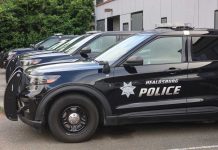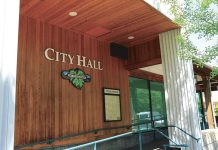Local committee will urge council to pass a resolution
modifying the USA Patriot Act
by BERT WILLIAMS, News Editor
The Windsor Bill of Rights Defense Committee will go to the
Windsor Town Council next week, seeking a resolution supporting
modification of the USA Patriot Act. Between now and then the
committee is working to get citizens to attend the meeting where
the discussion will take place.
“We are emphatically not asking for a repeal of the Patriot
Act,” said Defense Committee Chairman Charles Richard last week.
“We are seeking to modify some of its provisions. We are as
concerned as the next person about security. We know that there are
real threats. This effort is not about administration bashing. It
has nothing to do with the war. It is all about support for the
Constitution and especially the Bill of Rights.”
Richard cited a growing effort in the U.S. Congress to moderate
what some consider to be excesses in the Patriot Act. In particular
he pointed to a bill making its way through the U.S. House of
Representatives known as H.R. 3352. It has been titled The Security
and Freedom Ensured (SAFE) Act of 2003. The bill, sponsored by
Idaho Representative C. L. “Butch” Otter, is co-sponsored by 41
members of the house – six Republicans, 34 Democrats and one
independent.
In a letter to Richard, dated Jan. 21, 2004, Otter explained
that, in the light of the 9/11 terrorist attack, he agrees with
some of the new powers provided for in the Patriot Act, and he
supports large portions of the act. Some of its provisions,
however, he said he cannot support.
“The USA Patriot Act includes provisions regarding secret
courts, no-knock searches, and nationwide search warrants,” Otter
wrote. “(These are) all things our founding fathers had fought
against to gain their freedom.”
Otter said that many of the members of Congress who voted for
the Patriot Act have subsequently realized that “it was fear and
haste which caused them to overlook the most controversial aspects
of this legislation.” The result, Otter said, “is growing sentiment
in Congress to roll back some of these provisions.”
Bill H.R. 3352 seeks such a roll back. It proposes to modify
four sections of the Patriot Act, including:
€ Section 206 that allows the FBI to obtain authorization for
roving wiretaps without specifying the target of the wiretap or the
place to be wiretapped.
€ Section 213 that authorizes delayed notification warrants
permitting law enforcement officials to conduct secret searches and
to seize physical evidence without notifying the target until
later.
€ Section 215 that permits law enforcement officials to obtain
records with minimal judicial oversight (libraries and booksellers
are particularly concerned about this provision of the act).
€ Section 505 that allows the FBI to obtain sensitive personal
records without judicial approval, simply by certifying that they
are sought because of a terrorism or intelligence
investigation.
The bill also seeks to modify the definition of the term
“domestic terrorism,” which Otter says is presently so sweeping
that it can be used to target legitimate domestic civil
disobedience or protest.
U.S. Attorney John Ashcroft continues to defend the Patriot Act.
In a speech to the American Enterprise Institute on Aug. 19, 2003
Ashcroft said, “The Patriot Act gives us the technological tools to
anticipate, adapt, and out-think our terrorist enemy. To abandon
these tools would senselessly imperil American lives and American
liberty, and it would ignore the lessons of September 11.”
In his letter to Richard, Otter wrote, “The SAFE Act would
continue to provide law enforcement with the tools necessary for
winning the fight against terrorism while safeguarding the freedoms
of the American people.”
Richard insists that supporters of the SAFE Act are not “a
radical left-wing bunch of USA haters.” In support of this
assertion he cites National Rifle Association leaders Charlton
Heston and Wayne LaPierre, who have also opposed provisions in the
Patriot Act.
The Windsor Bill of Rights Defense Committee plans to urge the
Windsor Town Council to take a position in support of moderating
some provisions of the Patriot Act.
Richard lauded the council’s accomplishments, including the
town’s strengthening business climate, the progress of Town Green
Village and increased numbers of parks and recreation
opportunities.
“But I can’t imagine that they were obliged to take an oath of
allegiance to the U.S. Constitution if all they were to do was
simply the usual business of towns,” said Richard. “The library
thinks this is a local issue. We are making it a local issue.
Therefore, it is a local issue.”
Richard and others will make the case before the council on Feb.
18. The regularly-scheduled meeting begins at 6 p.m. in the town
hall, 9291 Old Redwood Highway, building 400.








